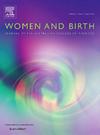Burnout, job satisfaction, and intention to leave among midwives in Western Switzerland: The role of caseload and hospital-based practice models
IF 4.1
2区 医学
Q1 NURSING
引用次数: 0
Abstract
Background
Burnout and job dissatisfaction among midwives compromise healthcare quality and workforce retention. Practice models, such as hospital-based versus caseload models, may influence midwives’ well-being and warrant further exploration.
Aim
To examine the association between midwifery practice models (caseload vs. hospital) and burnout, job satisfaction, and the intention to leave the profession among midwives in Western Switzerland.
Method
A cross-sectional survey was conducted with 392 midwives, using the Copenhagen Burnout Inventory to assess personal, work-related, and patient-related burnout. Multivariable logistic regression explored associations between practice models and burnout levels, job satisfaction, as well as retention in the profession.
Main results
Hospital midwives were over nine times more likely than caseload midwives to experience moderate to high work-related burnout (OR = 9.18, p < .001) and were 80 % less likely to report above average job satisfaction (OR = 0.21, p < .001), considering differences between socio-demographic and practice-related factors between the two groups of midwives. Nearly half of all hospital-based participants expressed an intention to leave compared to one in three caseload midwives. Higher burnout and lower job satisfaction were linked to intentions to leave the profession.
Discussion and conclusion
Caseload models may protect midwives’ well-being and promote job satisfaction and retention. These findings highlight the critical need for practice model changes and structural reforms in hospital midwifery, incorporating caseload principles, to support sustainable maternal and child healthcare in Western Switzerland and retain a resilient midwifery workforce.
瑞士西部助产士的职业倦怠、工作满意度和离职意向:病例负荷和医院实践模式的作用
助产士的职业倦怠和工作不满影响了医疗质量和劳动力保留。实践模式,如以医院为基础与病例负荷模式,可能会影响助产士的福祉,值得进一步探索。目的研究瑞士西部助产士的助产实践模式(病例量vs.医院)与职业倦怠、工作满意度和离职意向之间的关系。方法对392名助产士进行横断面调查,使用哥本哈根职业倦怠量表评估个人、工作相关和患者相关的职业倦怠。多变量逻辑回归探讨了实践模式与职业倦怠水平、工作满意度以及职业留任之间的关系。主要结果:考虑到两组助产士之间社会人口统计学和实践相关因素的差异,医院助产士经历中度至高度工作倦怠的可能性是个案助产士的9倍以上(OR = 9.18, p <; .001),报告高于平均水平的工作满意度的可能性低80 % (OR = 0.21, p <; .001)。近一半的医院参与者表示有意离开,而三分之一的病例助产士表示有意离开。较高的职业倦怠和较低的工作满意度与离开职业的意图有关。讨论与结论病例负荷模式可以保护助产士的幸福感,提高助产士的工作满意度和留任率。这些调查结果突出表明,迫切需要改变医院助产的实践模式和结构改革,纳入病例负荷原则,以支持瑞士西部的可持续妇幼保健,并保留一支有弹性的助产队伍。
本文章由计算机程序翻译,如有差异,请以英文原文为准。
求助全文
约1分钟内获得全文
求助全文
来源期刊

Women and Birth
NURSING-OBSTETRICS & GYNECOLOGY
CiteScore
7.20
自引率
13.20%
发文量
371
审稿时长
27 days
期刊介绍:
Women and Birth is the official journal of the Australian College of Midwives (ACM). It is a midwifery journal that publishes on all matters that affect women and birth, from pre-conceptual counselling, through pregnancy, birth, and the first six weeks postnatal. All papers accepted will draw from and contribute to the relevant contemporary research, policy and/or theoretical literature. We seek research papers, quality assurances papers (with ethical approval) discussion papers, clinical practice papers, case studies and original literature reviews.
Our women-centred focus is inclusive of the family, fetus and newborn, both well and sick, and covers both healthy and complex pregnancies and births. The journal seeks papers that take a woman-centred focus on maternity services, epidemiology, primary health care, reproductive psycho/physiology, midwifery practice, theory, research, education, management and leadership. We also seek relevant papers on maternal mental health and neonatal well-being, natural and complementary therapies, local, national and international policy, management, politics, economics and societal and cultural issues as they affect childbearing women and their families. Topics may include, where appropriate, neonatal care, child and family health, women’s health, related to pregnancy, birth and the postpartum, including lactation. Interprofessional papers relevant to midwifery are welcome. Articles are double blind peer-reviewed, primarily by experts in the field of the submitted work.
 求助内容:
求助内容: 应助结果提醒方式:
应助结果提醒方式:


